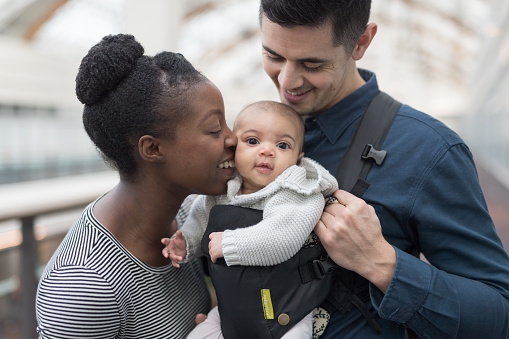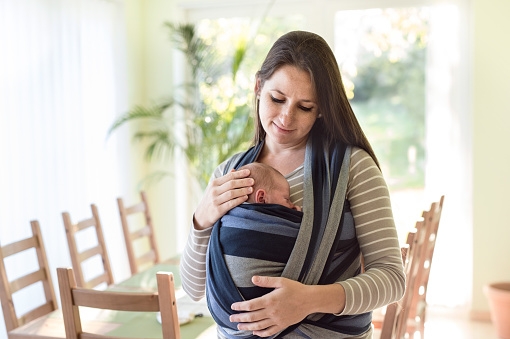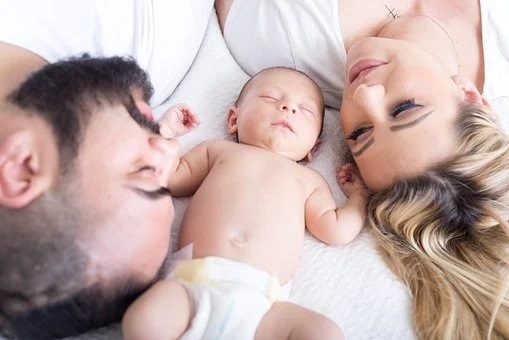The PRO's & CON's of attachment parenting
September 15th, 2020
1431 Views

The topic of attachment parenting (A/P) has certainly been a controversial one for some time now; with supporters in both camps and interesting facts and opinions on both sides. Whilst children can thrive on attachment parenting, their parents face plenty of negativity about their chosen parenting style, which can be hard to continue if they are the only parent in a group adhering to this method.
What is attachment parenting?
In essence, it is the style of parenting that responds to a baby’s needs for connection and the nurturing of a really strong connection between the parent and their child. Certainly, experts have long believed that an adult who is physically, mentally and emotionally well has had their needs met as a baby.
According to Webmd, attachment parenting "focuses on the nurturing connection that parents can develop with their children and this "nurturing connection is viewed as the ideal way to raise secure, independent, and empathetic children".
What are the plus points for attachment parenting?
Child experts have said that those parents favouring attachment parenting have found that their children have an easier time as toddlers. The child usually has fewer tantrums and certainly seems to develop a conscience at an earlier stage. If a child is soothed as a toddler, when they become an adult, they are able to self-soothe and handle their anxiety far more competently.
As they get older, these children are generally more cooperative with parents and other adults, and have better relationships with other children. At school they learn quicker and have good self-esteem and importantly, cope far better with any stressful situations.
What is attachment parenting?
In essence, it is the style of parenting that responds to a baby’s needs for connection and the nurturing of a really strong connection between the parent and their child. Certainly, experts have long believed that an adult who is physically, mentally and emotionally well has had their needs met as a baby.
According to Webmd, attachment parenting "focuses on the nurturing connection that parents can develop with their children and this "nurturing connection is viewed as the ideal way to raise secure, independent, and empathetic children".
What are the plus points for attachment parenting?
Child experts have said that those parents favouring attachment parenting have found that their children have an easier time as toddlers. The child usually has fewer tantrums and certainly seems to develop a conscience at an earlier stage. If a child is soothed as a toddler, when they become an adult, they are able to self-soothe and handle their anxiety far more competently.
As they get older, these children are generally more cooperative with parents and other adults, and have better relationships with other children. At school they learn quicker and have good self-esteem and importantly, cope far better with any stressful situations.

How do you do ‘attachment parenting’?
Attachment parenting is a philosophy and at its core is responding to your baby’s needs well when they are small actually means keeping them physically close to you at all times – hence the term ‘attachment parenting’. A/P strongly favours breast feeding and bed sharing amongst its ideas.
A/P is not been recommended by some experts in the fear that a child will become too dependent on their parent/carer. In reality, babies whose needs are fully met, tend to be much easier babies who turn into happier more confident adults. Keeping your baby/child close to you develops your bond with them and helps you to become instinctively empathetic so that you know what your child wants and how to deal with their need – that definitely takes the guesswork out of parenting! Baby experts reckon that 70% of the communication by young children is non verbal communication so it definitely increases parents’ awareness and understanding.
What aspects of A/P cause controversy?
Attachment parenting often includes certain aspects that society (on the whole) disapproves of. These Include breastfeeding, bed sharing and ‘baby wearing’ (carrying your baby around your home in a sling). Reflecting on babycare in the 1950s/1960s, attachment parenting is certainly at the other end of the spectrum! In those days, mothers were encouraged to bottle feed and certainly not to ‘demand feed’, strictness was required to ensure that babies stayed in their own beds at all times and during the day, when there were household jobs to do, babies/toddlers and young children were left to their own devices in a playpen!
How do a child’s needs change over the years?
Once your baby is confident that they have the security that you will always nurture and protect them, your baby will want to explore the outside world without being controlled, but they will regularly check that you are still right there for them. It is at this stage, that many parents try to control their child too strictly without knowing and respecting this crucial stage in their development. Instead of setting boundaries, many parents resist their child’s desires and will not stand back and let them explore and define their own capabilities and the result is conflict. There is plenty of research that shows that authoritarian parenting can damage a child’s emotional development.
At the same time, it must be said that attachment parenting is not about giving in to your child’s demands or being an over - indulgent parent, but always being there and sharing everything with your child to help to positively develop their character.
Attachment parenting is a philosophy and at its core is responding to your baby’s needs well when they are small actually means keeping them physically close to you at all times – hence the term ‘attachment parenting’. A/P strongly favours breast feeding and bed sharing amongst its ideas.
A/P is not been recommended by some experts in the fear that a child will become too dependent on their parent/carer. In reality, babies whose needs are fully met, tend to be much easier babies who turn into happier more confident adults. Keeping your baby/child close to you develops your bond with them and helps you to become instinctively empathetic so that you know what your child wants and how to deal with their need – that definitely takes the guesswork out of parenting! Baby experts reckon that 70% of the communication by young children is non verbal communication so it definitely increases parents’ awareness and understanding.
What aspects of A/P cause controversy?
Attachment parenting often includes certain aspects that society (on the whole) disapproves of. These Include breastfeeding, bed sharing and ‘baby wearing’ (carrying your baby around your home in a sling). Reflecting on babycare in the 1950s/1960s, attachment parenting is certainly at the other end of the spectrum! In those days, mothers were encouraged to bottle feed and certainly not to ‘demand feed’, strictness was required to ensure that babies stayed in their own beds at all times and during the day, when there were household jobs to do, babies/toddlers and young children were left to their own devices in a playpen!
How do a child’s needs change over the years?
Once your baby is confident that they have the security that you will always nurture and protect them, your baby will want to explore the outside world without being controlled, but they will regularly check that you are still right there for them. It is at this stage, that many parents try to control their child too strictly without knowing and respecting this crucial stage in their development. Instead of setting boundaries, many parents resist their child’s desires and will not stand back and let them explore and define their own capabilities and the result is conflict. There is plenty of research that shows that authoritarian parenting can damage a child’s emotional development.
At the same time, it must be said that attachment parenting is not about giving in to your child’s demands or being an over - indulgent parent, but always being there and sharing everything with your child to help to positively develop their character.
What are the negatives of A/P?
Those who are sceptical about the philosophy of attachment parenting, cite the following reasons that they feel can prove detrimental:
1. A child needs space, but one of the main ideas of A/P is to keep your child close to you whilst you establish a nurturing connection with them.
2. Some parents do not discipline when they should for fear of damaging the attachment they share – this can lead to bigger problems later.
3. If a child becomes used to have someone right there to help with everything, it can make them over-dependent on a parent.
4. Many children who have been brought up in this way could be lacking in skills and the development of skills because they lack independence. Some parents help children too much with simple tasks and even homework and do not stand back quietly to let their child forge ahead.
5. This type of parenting can be at the cost of other relationships as the child is firmly in first place and given priority. If only one parent is practising A/P, the other parent can definitely feel left out and neglected. In effect, A/P can only work effectively if both parents are sharing this method.
Those who are sceptical about the philosophy of attachment parenting, cite the following reasons that they feel can prove detrimental:
1. A child needs space, but one of the main ideas of A/P is to keep your child close to you whilst you establish a nurturing connection with them.
2. Some parents do not discipline when they should for fear of damaging the attachment they share – this can lead to bigger problems later.
3. If a child becomes used to have someone right there to help with everything, it can make them over-dependent on a parent.
4. Many children who have been brought up in this way could be lacking in skills and the development of skills because they lack independence. Some parents help children too much with simple tasks and even homework and do not stand back quietly to let their child forge ahead.
5. This type of parenting can be at the cost of other relationships as the child is firmly in first place and given priority. If only one parent is practising A/P, the other parent can definitely feel left out and neglected. In effect, A/P can only work effectively if both parents are sharing this method.

How do I develop my own style of attachment parenting?
There are definitely pros and cons to attachment parenting, but the keyword to success is moderation. It is very important for a parent to connect with their child and enjoy a close relationship that nurtures them through the different stages of childhood. Having said that, it is equally important to give your child a framework to their days with boundaries so that they can feel free to explore the world around them and discover so many things – but always with you quietly in the background ready to support them in a moment of difficulty.
Attachment parenting is not a cult and it does not have fixed rules. Parents can choose the aspects that will work for them – for example, whilst it is good to keep your baby/toddler close to you, there are some children that hate being cuddled and just want to explore! Likewise, there is no point in beating yourself up if you can’t breastfeed, use a bottle, but enjoy quiet and cuddly moments with your baby rather than handing them over for someone else to feed.
At the end of the day, it is what works best for your family as each baby is special and unique....
There are definitely pros and cons to attachment parenting, but the keyword to success is moderation. It is very important for a parent to connect with their child and enjoy a close relationship that nurtures them through the different stages of childhood. Having said that, it is equally important to give your child a framework to their days with boundaries so that they can feel free to explore the world around them and discover so many things – but always with you quietly in the background ready to support them in a moment of difficulty.
Attachment parenting is not a cult and it does not have fixed rules. Parents can choose the aspects that will work for them – for example, whilst it is good to keep your baby/toddler close to you, there are some children that hate being cuddled and just want to explore! Likewise, there is no point in beating yourself up if you can’t breastfeed, use a bottle, but enjoy quiet and cuddly moments with your baby rather than handing them over for someone else to feed.
At the end of the day, it is what works best for your family as each baby is special and unique....
Chrissie x

